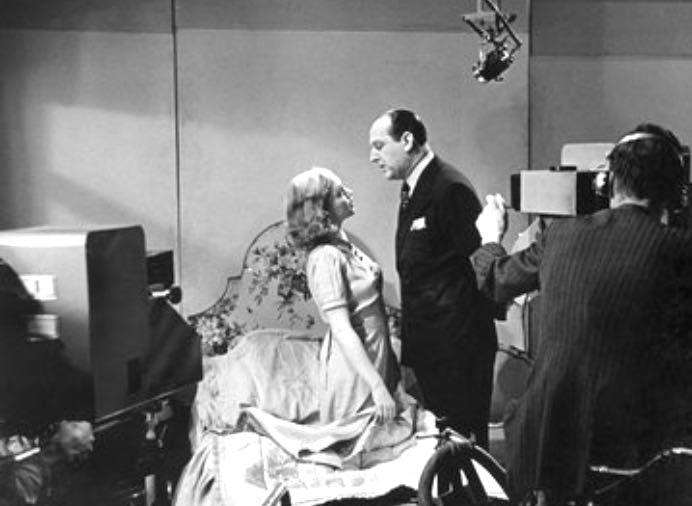OTD in early British television: 5 March 1939

John Wyver writes: The evening of Sunday 5 March 1939, from 9.08pm to 10.54pm, was taken up with a studio restaging of Little Ladyship (above), written by Ian Hay after the Hungarian original by Istvan Bekeffi and Adorjan Stella. For one night only Gardner Davies’ successful staging had been translated by producer Lanham Titchener from the Strand Theatre to the AP studios.
A little over a week later, the show prompted a letter to the press from theatrical impresario Emile Littler, complaining that while conventional theatres were barred by law from opening on Sundays, there was no such restriction on television. Littler’s letter was one salvo in a campaign that would only reach a successful conclusion 33 years later.
The one review of the television broadcast that I have found is by ‘E.H.R.’ for The Observer:
My family is divided on the subject of Ian Hay’s comedy Little Ladyship, which occupoied the whole of last Sunday’s evening programme. The males judged it first-class entertainment. The females, not falling victim to the charm and cleverness of Lilli Palmer, pointed out the impossibilities and weaknesses of the play itself.
All are agreed, however, that from the television point of view the transfer for one night from the Strand Theatre to the Alexandra Palace studio was done remarkably well.
Impresario Emile Littler was far less forgiving, as he expressed in his letter to the Daily Telegraph:
The living theatre in England is not allowed by law to open [on Sundays], yet a Government department can engage all the artists in this ‘fun in a girls’ school’ play to give a performance requiring make-up and employing the use of sight and sound on a Sunday.
Surely if full performances of plays are allowed to take place by Government monopoly it is time our living theatres were allowed facilities to compete with the cinemas by opening on Sunday.
For a column the next day, the paper’s correspondent George Bishop opened up his contacts book and solicited statements of support from other theatrical luminaries. J.B. Priestley was especially vocal:
If it is right for television it is right for the theatre. There is no argument about it. I am all for the theatre opening on Sunday — if necessary, closing on Monday. It raises the whole question of the relation between the BBC and the theatre.
Others who expressed themselves in agreement with Littler were producer Alec Rea and H.M. Tennent, general manager of Drury Lane, along with Basil Dean:
If television is to deal in entertainments of this nature on Sunday, it should at least be subject to the same restrictions as are imposed on Sunday cinemas. I was the first to televise an entire play. That is what I think about television, but the theatre should have equal rights.
The position with regard to cinema opening was complex and was inconsistently applied across the country, as the ITP Global Film blog explains:
In 1932 The Sunday Entertainments Act then required licensing authorities to control opening hours on a Sunday. If cinemas were to now open on Sundays, they could only do so if they followed licensing regulations re hours of operation…
In the 1920s and early 1930s various campaigns by church groups had urged the closure of cinemas on Sundays for two main reasons: the popularity of cinemas might deter churchgoers from attending Sunday services and the depravity and generally lax morals of film narratives were anti-Christian. If local authorities thought that these campaigns represented the majority of their local ratepayers, they could keep cinemas closed on Sundays. But the Act also allowed them to hold a poll and to abide by the results.
The overall result of the new legislation (which was applicable only in England and Wales – Scotland and Northern Ireland had separate legislation) was that Sunday film screenings were stopped in some local authority areas and available in others, albeit with restrictions (e.g. not open before 4.30 pm).
Despite the arguments of Emile Littler and many others, legislation kept theatres closed on Sundays until 1972, when The Stage reported on 4 May:
After enduring decades of active campaigning and bitter disappointments, members of all walks of the theatrical profession awoke one morning last week to discover, to their amazement, that the Bill to allow theatres to open on Sundays had been finally approved by the Commons, without dissension and without a single voice being raised in protest…
Sunday opening is likely to create a new theatregoing public consisting of those people whose only free day is Sunday. The habit of Sunday theatregoing is likely to mushroom and produce all sorts of results beneficial to the profession.
But in fact this is not what happened, and even today many theatres remain dark on Sundays, and the situation is not that different from when Lyn Gardner wrote about this question 15 years ago:
With their doors firmly closed on Sundays, while the local cinemas and art galleries are open for business, too many theatres are operating on outdated models that suit their own convenience – and, perhaps, the convenience of the unions – but not the convenience of audiences.
Leave a Reply